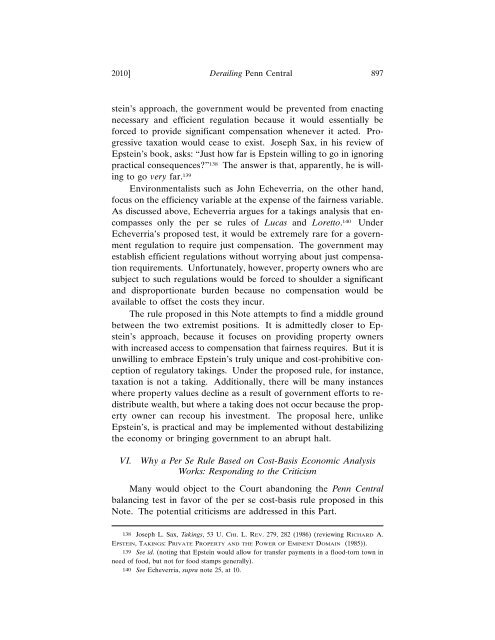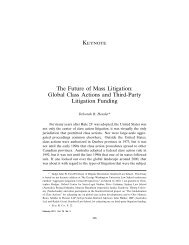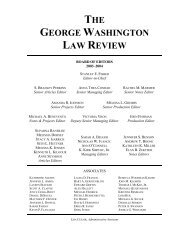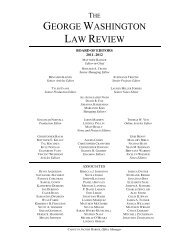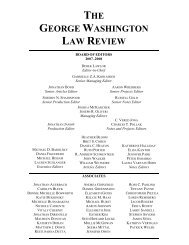View PDF - The George Washington Law Review
View PDF - The George Washington Law Review
View PDF - The George Washington Law Review
You also want an ePaper? Increase the reach of your titles
YUMPU automatically turns print PDFs into web optimized ePapers that Google loves.
2010] Derailing Penn Central 897<br />
stein’s approach, the government would be prevented from enacting<br />
necessary and efficient regulation because it would essentially be<br />
forced to provide significant compensation whenever it acted. Progressive<br />
taxation would cease to exist. Joseph Sax, in his review of<br />
Epstein’s book, asks: “Just how far is Epstein willing to go in ignoring<br />
practical consequences?” 138 <strong>The</strong> answer is that, apparently, he is willing<br />
to go very far. 139<br />
Environmentalists such as John Echeverria, on the other hand,<br />
focus on the efficiency variable at the expense of the fairness variable.<br />
As discussed above, Echeverria argues for a takings analysis that encompasses<br />
only the per se rules of Lucas and Loretto. 140 Under<br />
Echeverria’s proposed test, it would be extremely rare for a government<br />
regulation to require just compensation. <strong>The</strong> government may<br />
establish efficient regulations without worrying about just compensation<br />
requirements. Unfortunately, however, property owners who are<br />
subject to such regulations would be forced to shoulder a significant<br />
and disproportionate burden because no compensation would be<br />
available to offset the costs they incur.<br />
<strong>The</strong> rule proposed in this Note attempts to find a middle ground<br />
between the two extremist positions. It is admittedly closer to Epstein’s<br />
approach, because it focuses on providing property owners<br />
with increased access to compensation that fairness requires. But it is<br />
unwilling to embrace Epstein’s truly unique and cost-prohibitive conception<br />
of regulatory takings. Under the proposed rule, for instance,<br />
taxation is not a taking. Additionally, there will be many instances<br />
where property values decline as a result of government efforts to redistribute<br />
wealth, but where a taking does not occur because the property<br />
owner can recoup his investment. <strong>The</strong> proposal here, unlike<br />
Epstein’s, is practical and may be implemented without destabilizing<br />
the economy or bringing government to an abrupt halt.<br />
VI.<br />
Why a Per Se Rule Based on Cost-Basis Economic Analysis<br />
Works: Responding to the Criticism<br />
Many would object to the Court abandoning the Penn Central<br />
balancing test in favor of the per se cost-basis rule proposed in this<br />
Note. <strong>The</strong> potential criticisms are addressed in this Part.<br />
138 Joseph L. Sax, Takings, 53 U. CHI. L. REV. 279, 282 (1986) (reviewing RICHARD A.<br />
EPSTEIN, TAKINGS: PRIVATE PROPERTY AND THE POWER OF EMINENT DOMAIN (1985)).<br />
139 See id. (noting that Epstein would allow for transfer payments in a flood-torn town in<br />
need of food, but not for food stamps generally).<br />
140 See Echeverria, supra note 25, at 10.


